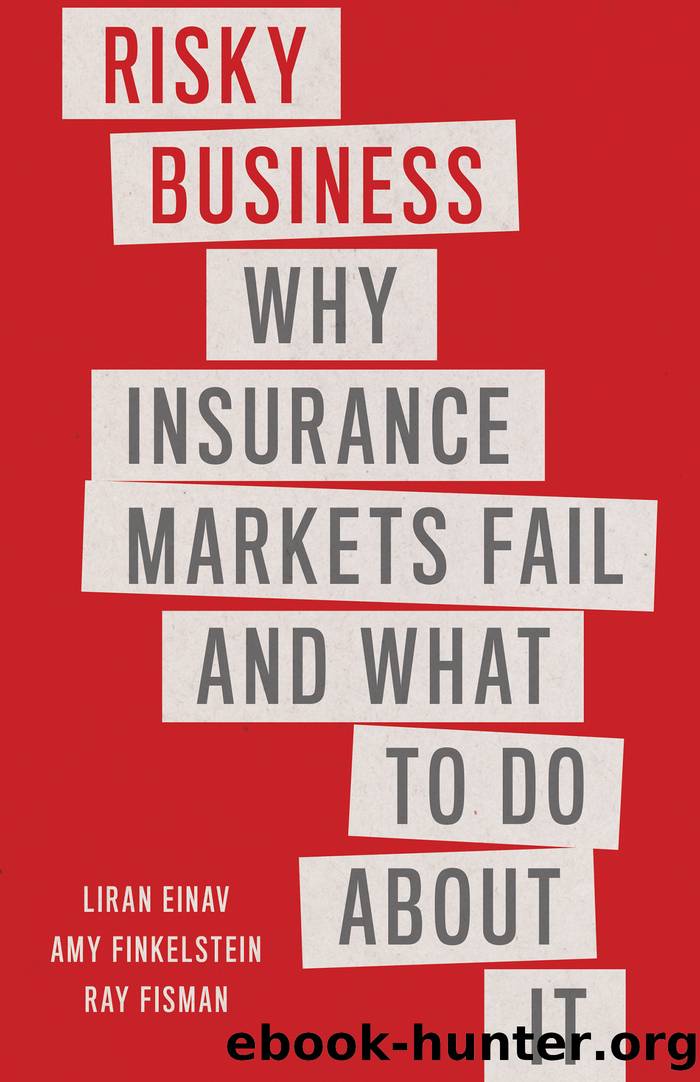Risky Business by Liran Einav

Author:Liran Einav
Language: eng
Format: epub
Publisher: Yale University Press
Published: 2022-06-15T00:00:00+00:00
Up-Front Commitment to Insurance
Short of running off to join a kibbutz, what are we to do? And short of setting up for-profit kibbutzim, what else might insurance companies offer that extracts something that approximates a longer-term commitment from its customers? It turns out that insurance companies and kibbutzim have more in common than you (or we) might have thoughtâinsurers also try to get their members to fork over some of their assets, to decrease the temptation to renege on a long-term commitment. Itâs perhaps for this reason that Wirecutter advises pet owners to buy their pet health insurance when their pet is young, in order to lock in good rates before they find out that Fluffy has a bad back.20
Beyond advice from Wirecutter, a lot of what we know about the role of long-term commitment in trying to prevent selection in insurance comes from a study by the economists Igal Hendel and Alessandro Lizzeri.21 Hendel and Lizzeri start with the observation we made earlier: itâs not practical to write a very long-term insurance contract. For one thing, as they note, from a legal perspective, a company can be legally bound to insure its beneficiaries at an agreed-on price with agreed-on coverage into the indefinite future, but its customers canât be legally required to continue to uphold their end of the bargainâthat is, to continue to pay premiums. Moreover, we would argue, even if it were legally enforceable, it would be difficult to execute in practice. Is it really practical for an insurance company to pursue a client who refuses to pay their premiums? Howâs the company going to make the customer pay? (Weâll revisit these types of issues in chapter 6, when we discuss the difficulties the government has enforcing insurance mandates.)
Since an insurer cannot force its customers to keep paying premiums year after year, the customer may switch companies if another company offers more favorable terms. In particular, if the customer learns that theyâre healthier than they thought, theyâll go get a better deal from a new company, leaving the original provider stuck with only the âbadââthat is, sickâcustomers.
Hendel and Lizzeri suggest that this is why life insurance companies often try to front-load premiumsâthey have customers pay more in earlier years of the contract than the customerâs mortality risk warrants and less in later years. Because once youâve prepaid a bunch of your premiums, itâs less tempting to switch to a new company.
To see this more concretely, consider two healthy forty-year-oldsâletâs call them Walter and Bartâwho, as they start to worry about providing for their young families, each buy $100,000 life insurance policies with a $2,500 annual premium from the Pacific All Risk Insurance Company. The $2,500 premium reflects the average cost of covering both the unlucky policyholdersâthose who die earlier than expected and cost the company $100,000 after paying just a few premiumsâand the healthier ones as well, who pay more than $100,000 in premiums by living beyond age eighty. (By paying $2,500 every year, living beyond eighty translates into more than forty premium payments, which exceeds the $100,000 life insurance payout.
Download
This site does not store any files on its server. We only index and link to content provided by other sites. Please contact the content providers to delete copyright contents if any and email us, we'll remove relevant links or contents immediately.
| Automobile | Business |
| Casualty | Health |
| Liability | Life |
| Property | Risk Management |
The Secrets of Successful Financial Planning by Dan Gallagher(1523)
A Knight's Reward by Catherine Kean(1337)
An American Sickness by Elisabeth Rosenthal(1266)
Against the Gods by Peter L. Bernstein(1115)
FREAKONOMICS by levitt steven d(1106)
SuperFreakonomics by Steven D. Levitt(1084)
America's Bitter Pill: Money, Politics, Backroom Deals, and the Fight to Fix Our Broken Healthcare System by Steven Brill(1077)
America's Bitter Pill by Steven Brill(1068)
A Practical Introduction to Security and Risk Management by Bruce Oliver Newsome(1038)
Risk Management Framework by James Broad(1036)
Strategic Risk Taking: A Framework for Risk Management by Aswath Damodaran(1031)
2019 Social Security & Medicare Facts by Michael D. Thomas(1030)
The Globetrotter's Guide to Travel Insurance: Travel Smarter, Pay Less, Get the Right Coverge (The Savvy Traveler Series Book 1) by Bauche Michael & Bauche Yvonne(1027)
Game Changers by Rudolf Taschner(1012)
The New Frontier Investors by Jagdeep Singh Bachher Adam D. Dixon & Ashby H. B. Monk(1009)
How Our Days Became Numbered: Risk and the Rise of the Statistical Individual by Dan Bouk(997)
SUPERFREAKONOMICS by levitt steven d(934)
The 8 Characteristics of the Awesome Adjuster by Carl van Lamsweerde(929)
The Advisor Playbook: Regain Liberation and Order in your Personal and Professional Life by Duncan MacPherson & Chris Jeppesen(888)
